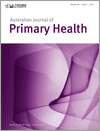
Australian Journal of Primary Health
Scope & Guideline
Advancing Knowledge in Primary Health and Policy
Introduction
Aims and Scopes
- Focus on Primary Health Care:
The journal emphasizes research that enhances the understanding and practice of primary health care, including the roles of general practitioners, nurses, and allied health professionals in delivering effective healthcare. - Culturally Competent Care:
A significant aspect of the journal's research is dedicated to culturally sensitive and inclusive health practices, particularly in relation to Aboriginal and Torres Strait Islander health, as well as culturally and linguistically diverse populations. - Chronic Disease Management:
There is a strong focus on chronic disease prevention and management strategies, highlighting the importance of integrated care models and community health initiatives. - Health Equity and Access:
Research published in the journal addresses health disparities and the social determinants of health, aiming to improve access to care for underserved populations. - Innovative Health Models:
The journal explores new models of care, including telehealth and community-based programs, showcasing innovative approaches to meet the evolving needs of the healthcare system. - Interdisciplinary Collaboration:
The journal promotes studies that encourage collaboration among various health professionals, fostering a team-based approach to patient care.
Trending and Emerging
- Digital Health Innovations:
There is an increasing focus on digital health technologies, including telehealth and e-health initiatives, which are transforming how care is delivered and accessed, particularly in response to the COVID-19 pandemic. - Community Engagement and Co-Design:
Research that involves community engagement and co-design processes is on the rise, emphasizing the importance of involving patients and communities in the development of health programs and services. - Interprofessional Collaboration:
Emerging studies highlight the necessity for interdisciplinary teamwork in primary care, showcasing how collaboration among various health professionals can enhance patient outcomes. - Health Equity Research:
There is a growing emphasis on health equity, particularly in addressing disparities faced by Aboriginal and Torres Strait Islander populations and other marginalized groups, reflecting a commitment to social justice in healthcare. - Chronic Disease Prevention and Management:
An increasing number of studies are focusing on integrated care models for chronic disease prevention and management, combining efforts from various sectors to improve patient health outcomes. - Mental Health Integration:
Research addressing the integration of mental health services within primary care is gaining traction, recognizing the critical role of mental well-being in overall health.
Declining or Waning
- Traditional Clinical Practices:
There appears to be a decline in research focusing solely on traditional clinical practices without an emphasis on innovative or integrated approaches, as the sector increasingly favors models that incorporate technology and community engagement. - Single-Disease Focus:
Research concentrating on single-disease management is becoming less frequent, making way for studies that address multimorbidity and integrated care solutions. - In-Person Consultations:
With the rise of telehealth and digital health solutions, research centered on in-person consultations has been waning, as the healthcare community adapts to new modes of service delivery. - General Practitioner-Centric Studies:
There is a noticeable reduction in studies that exclusively focus on the roles and perspectives of general practitioners, as the journal expands its scope to include a broader range of health professionals. - Reactive Health Interventions:
Research that focuses on reactive rather than proactive health interventions is becoming less prominent, with a shift towards preventive care and health promotion strategies.
Similar Journals
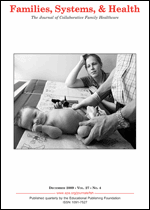
Families Systems & Health
Innovating practices to enhance family health outcomes.Families Systems & Health is a pivotal journal published by the Educational Publishing Foundation of the American Psychological Association, focusing on the intersection of family dynamics and health outcomes. Established in 1996, this peer-reviewed journal provides a platform for researchers, practitioners, and students to explore and disseminate innovative research findings, theoretical frameworks, and applied practices that enhance our understanding of family systems in relation to health and mental health. With a current impact factor situated within the 27th percentile for its categories of Applied Psychology and Psychiatry and Mental Health, Families Systems & Health remains a crucial resource for professionals seeking to apply family-oriented approaches in clinical settings. As the journal continues to evolve through its converged publishing years, it aims to contribute significantly to the empirical dialogue surrounding the health of families, ultimately fostering advancements in both academic research and practical applications. Access to the journal is not open, ensuring a curated dissemination of quality research that emphasizes its commitment to advancing knowledge in this essential field.

Rural and Remote Health
Exploring innovative solutions for rural health challenges.Rural and Remote Health is a distinguished open-access journal published by the College of Medicine & Dentistry, James Cook University Townsville, dedicated to advancing the discourse in the field of rural and remote health care. With a strong emphasis on emergency medical services, public health, and social sciences, this journal places a critical spotlight on the unique health challenges faced by underserved populations. Since its inception in 2001, it has made significant contributions to the academic community, achieving Q1 status in Emergency Medical Services and Q2 rankings in various related categories in 2023. The journal operates with a commitment to promoting equitable health outcomes, making research accessible to a global audience. Leveraging its position within the Scopus database, where it ranks favorably among its peers, Rural and Remote Health aims to foster interdisciplinary collaboration among researchers, health professionals, and students interested in the complexities of health care delivery in rural regions. The publication not only seeks to disseminate high-quality research but also to stimulate innovative solutions addressing the pressing health disparities faced by remote communities.
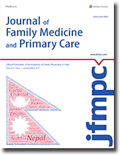
Journal of Family Medicine and Primary Care
Exploring New Frontiers in Primary HealthcareThe Journal of Family Medicine and Primary Care is a premier, peer-reviewed academic journal dedicated to the fields of family medicine and primary healthcare. Published by Wolters Kluwer Medknow Publications, this Open Access journal has been providing a platform for the dissemination of valuable research since 2012, offering researchers, practitioners, and scholars unrestricted access to a wealth of knowledge in primary care practices, policies, and innovations. The journal seeks to bridge the gap between academia and practice by publishing original articles, reviews, and case studies that address contemporary issues in family medicine, thereby enhancing patient care and outcomes. With a commitment to advancing the field, the journal serves as an essential resource for those striving to improve the delivery and effectiveness of healthcare services within families and communities.

BMC Primary Care
Fostering Knowledge to Transform Primary CareBMC Primary Care is a leading peer-reviewed journal published by BMC that provides a vital platform for the dissemination of research and developments in the field of primary care. Established in 2022 as an open access journal, it allows for greater accessibility and visibility of research findings. Operating from the United Kingdom, BMC Primary Care has rapidly assumed an esteemed position within the academic community, currently ranked in the Q1 category for both Family Practice and Medicine (miscellaneous) based on 2023 metrics. With a Scopus rank of #9 out of 56 in Family Practice, positioned in the 84th percentile, this journal serves as an essential resource for researchers, healthcare practitioners, and students seeking to enhance their understanding of primary care dynamics. Through a commitment to high-quality research, BMC Primary Care aims to foster innovation and effective practices that ultimately improve patient care and health outcomes.

Journal of Primary Health Care
Innovating solutions for diverse health challenges.Journal of Primary Health Care, published by CSIRO PUBLISHING, is a premier open-access journal dedicated to advancing the field of primary health care since its inception in 2009. With an E-ISSN of 1172-6156, the journal serves as a vital platform for disseminating innovative research and practices that improve health outcomes across diverse populations. Featuring a robust H-index and notable rankings—including Q2 in Family Practice and Q3 in both Medicine (miscellaneous) and Public Health—this journal holds a significant position within the academic community, offering valuable insights to researchers, practitioners, and students alike. By providing open-access options, the Journal of Primary Health Care ensures that its findings are accessible to a global audience, promoting collaboration and knowledge sharing. As we look toward 2024, we invite contributors to be part of this dynamic conversation, addressing the critical issues in primary health care delivery and policy.
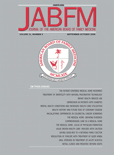
Journal of the American Board of Family Medicine
Fostering Innovation and Excellence in Family Healthcare.The Journal of the American Board of Family Medicine, with ISSN 1557-2625 and E-ISSN 1558-7118, is a prestigious publication dedicated to advancing the field of family medicine. Published by the American Board of Family Medicine, this journal has established itself as a vital resource for researchers, practitioners, and students interested in both family practice and public health. As of 2023, it boasts impressive rankings, being in the Q1 category of Family Practice and the Q2 category of Public Health, Environmental and Occupational Health according to Scopus metrics, reflecting its significant impact and influence in the academic community. The journal's focus on high-quality research ensures that it remains at the forefront of evidence-based practice, fostering the dissemination of knowledge that is critical for improving patient care and outcomes. This journal, although not open-access, provides a wealth of insights and findings relevant to professionals striving to enhance their understanding and implementation of best practices in family medicine. With a converged publication history starting in 2002, it continues to serve as an essential platform for innovative studies and discussions that shape the future of family medicine.
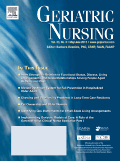
Geriatric Nursing
Fostering knowledge and innovation in geriatric nursing.Geriatric Nursing is a premier peer-reviewed journal dedicated to advancing the field of gerontology and nursing care for older adults. Published by MOSBY-ELSEVIER, this esteemed journal holds a significant place in the academic community with its Q2 ranking in both Gerontology and Medicine (miscellaneous) as of 2023, reflecting its importance and influence in the study and practice of healthcare for the elderly. With a comprehensive coverage extending from 1980 to 2024, Geriatric Nursing addresses the latest research, clinical practices, and policies impacting geriatric care, making it an essential resource for researchers, practitioners, and students alike. Although it does not provide open access options, its rigorous content garners attention with a Scopus Rank of #14 out of 39 in Nursing and Gerontology, placing it in the 65th percentile for its field. For those dedicated to improving the health and wellbeing of older populations, Geriatric Nursing remains a critical platform for innovation and knowledge dissemination.

JOURNAL OF RURAL HEALTH
Exploring Solutions for Health Challenges in Rural Areas.JOURNAL OF RURAL HEALTH, published by WILEY, serves as a leading platform for research in the dynamic field of rural health, encompassing both public health and environmental studies. With an impressive impact factor and a ranking of #75 out of 665 in the Scopus database for Public Health, it stands prominently in the Q1 category, reflecting its high-quality contributions to the discipline. Established in 1985, this journal targets the unique challenges and innovations in rural healthcare, making it essential reading for researchers, practitioners, and policymakers aiming to enhance health outcomes in less accessible areas. Although this journal is not open access, it disseminates vital research that informs evidence-based practices and policies aimed at improving rural health systems. For anyone engaged in or studying rural health, this journal is an invaluable resource to stay abreast of the latest findings and trends.
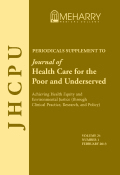
JOURNAL OF HEALTH CARE FOR THE POOR AND UNDERSERVED
Empowering the underserved with knowledge and research.JOURNAL OF HEALTH CARE FOR THE POOR AND UNDERSERVED, published by Johns Hopkins University Press, serves as a pivotal platform dedicated to advancing knowledge and research in the fields of public health, healthcare accessibility, and social determinants of health. With its ISSN 1049-2089 and E-ISSN 1548-6869, this esteemed journal has been at the forefront of addressing health disparities and improving health outcomes for marginalized populations since its inception in 1990. As a distinguished Q2 journal in Public Health and Environmental and Occupational Health, it ranks in the 36th percentile of its category according to Scopus, underscoring its relevance and impact within the academic community. The journal offers a range of articles, including original research, review articles, and case studies, focusing on innovative strategies and policies to enhance healthcare delivery for underserved populations. By contributing significant insights and evidence-based practices, the JOURNAL OF HEALTH CARE FOR THE POOR AND UNDERSERVED is an essential resource for researchers, health professionals, and students committed to fostering equity in healthcare access and outcomes.
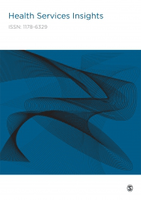
Health Services Insights
Bridging gaps in health knowledge for all.Health Services Insights is a prestigious, open-access journal published by SAGE Publications Inc. Based in the United Kingdom, this journal has become a vital resource for researchers and professionals in the fields of Health Policy and Public Health. Since its inception in 2008, Health Services Insights has consistently aimed to disseminate high-quality, peer-reviewed research that informs practice and policy in health service delivery and management. With an impressive Q1 ranking in both its categories as of 2023, and a respectable Scopus ranking positioning it within the upper percentiles of its fields, the journal continues to attract influential contributions from global experts. Its open-access format, established in 2013, ensures that vital insights on health services are accessible to all, facilitating knowledge sharing and collaboration among researchers, practitioners, and students alike. By focusing on impactful research and innovation, Health Services Insights plays a crucial role in addressing contemporary challenges in health services and improving health outcomes worldwide.